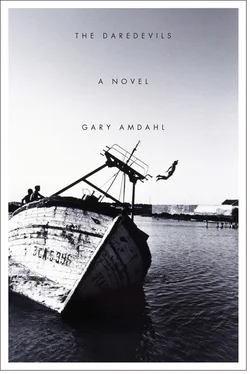“Having still no actionable clue as to what you are talking about, I will nevertheless promise you that if it is ever within the scope of my immature intellect to distinguish the two, I will do so. I will attempt to do so, at any rate — for no other reason than that you have said so with such clear strength of feeling.”
“ Goddamn you .” Suddenly Sir Edwin was no longer acting. It was a gift.
“Goddamn me.”
“Goddamn you.”
“All right then,” Charles said, still game, but inwardly beginning to shy. “Goddamn me.”
Sir Edwin turned away in disgust and Charles saw that though he had not exactly missed the man’s inscrutable and alcoholic signs and crucial but murky inflections, he had, once again, ignored them, and was now, consequently, imperiled. Sir Edwin was panting with stifled rage.
“I tell you to go down there and act like a man, to grab those infants by the scruffs of their necks and shake them until it’s clear they are no longer in their playpens — and you simper like the rich parlor fucking smart ass that you incontrovertibly are and will always be. I tell you it’s nauseating and you become a pale imitation of Oscar Wilde. I CAN’T STAND IT ANYMORE!” The last was a shriek and he was now very nearly in tears. “Over and over and over again — do you not, do you really not, are you incapable, completely FUCKING INCAPABLE of understanding what we are struggling against? Conformation to the etiquette of the stage, to its infantile rules and bourgeois complacencies — it’s like fucking a corpse. It’s loathsome. Or it would be if it were real. It is merely ridiculous, merely embarrassing.”
Sir Edwin sat down and pulled his cloak around him so that not even his eyes could be seen. He hunched forward and appeared to be weeping, but made no sound. After a short while, he seemed to relax. He sat back and the cloak fell away from his face. He breathed deeply and evenly.
“And so,” Charles said, “just to make sure I understand you, I am to not confuse desire with pleasure. Was that it?”
Sir Edwin refused to look at him.
“Was that fucking it ?” Charles demanded.
Sir Edwin was weary now, and wise. “I meant only to suggest that there are layers and layers of desire for pleasure. We actors revel quite rightly in these superficial desires, in the gratification of these superficial desires — that is what we are paid to do. Still, the corpse is a corpse and her cunt is full of maggots. I’m not trying to be outrageous — you know this as well as I do. We all know. What you may not know is that beneath all those layers of pleasures is a primary desire. We may think of it as an original desire. We may think of it as a primal desire. You must show us, if you can, what it is to want food, to want sex, to want to brain another man so you can have his food and his women — but you are exhibiting the superfice. You may bring something to life if you are successful. And that is the great desire you must not confuse with pleasure: simply to be alive.”
He began weeping again, loudly, with a kind of abandoned happiness, and Charles descended to the stage.
The stage was high enough so that when Charles came to the leading edge of it he was looking at his actors’ shoes as they shuffled and swept left and right, forward and back. He tipped his head back and called out for everyone to mark out a playing space and begin to go through the motions and whisper the lines of whatever scene marked their entrance into The American. After they’d done so for a few minutes, over the gentle, strange murmuring punctuated by the creak and clap of the boards, he told them to speak up and to slow down.
From the balcony Sir Edwin shouted. “NOTICE HOW THE NATURE—”
And Charles took it up, almost as if he were echoing Sir Edwin: “Notice how the nature of what you are doing changes along with the speed, your apprehension and judgment of what you are doing.”
A few more minutes passed and he climbed up on the stage, moving around an imaginary painting on an easel, speaking Christopher Newman’s first lines of the play—“That’s just what I wanted to see!”—while the young woman who was the imaginary painting’s painter, Noémie, fell in with him.
“Now half again as slow and notice—”
“NOTICE HOW YOUR THOUGHTS STILL LAG BEHIND YOUR ACTIONS, EVEN WHEN YOU HAVE COME NEARLY TO A STANDSTILL!”
“Move as slowly as you can move and still maintain a sense of one single continuous movement and notice how your thoughts still lag behind your actions, which indeed are reactions themselves to something we cannot see, name, understand.”
“ASK YOURSELF WHY YOU DO NOT FEEL WHOLE WHEN YOU ARE A CHARACTER!” shouted Sir Edwin, who then began again to sob, loudly — and, it had to be said, histrionically.
“Pick a new scene,” said Charles. “Move normally, speak softly.”
Vera — Claire de Cintré—joined him for their first scene together. Charles spoke his lines with her for a while—“It’s as if there had been a conspiracy to baffle me tonight: we have been kept asunder from the moment I arrived”—then said, “Indeed, as Sir Edwin suggests, you know who you are at the expense of being happy. Ask yourself why that is. Know that you will never be happy until there is no division between you and the other characters. Know that you are sinning when you are isolated and alone on the stage. Know that sin means only that you have missed the point and that repentance means only to change your perspective. You in your isolation have created the other characters and now you are afraid of them, of what they will do, of how you will act in consequence. You created them but you are afraid of being dragged into their lives. Do not be afraid, my actors. You are living in a constant state of anxiety and anticipation. Change your sinning way: everything is waiting for you, here on the stage, in the character of the other.”
Again he gave them just a few minutes, two or three, then asked them to slowly and gently cease to speak and move. He asked them to savor the silence and stillness and yet remember where they were and what they were doing. When they were ready, calm and alert, they were to return to the scenes they had just been acting but include the other characters in the scene, two or three others, reform, as it were, and choose a property that was important to the scene, a chair or an easel.
“You will never be convincing on a stage, my friends, if you cannot treat your props properly. You must see and use them — and allow them to use you — in exactly the same way you see and use and are used by the other human beings onstage with you. A chair is every bit as miraculous as a human being is. Look at the chair, feel it. It is floating there in space just as you are. Just as the planet does. Its constituent parts are your constituent parts. You may wish to think of yourself as related to your property interdependently. This in truth is how we live. Distinctions between consciousness and self-consciousness, between organic and inorganic are only superficially true and useful. Consider the story the chair will tell: as we are flesh, it is wood, fashioned by a maker in a shop, who got the wood from a timber merchant, who got the wood, with subtle but overwhelming violence, from a tree in the forest. Of course you tell yourself you know where the tree came from: it grew from a seed. Break open the seed: Is it empty or merely invisible? Without water, and soil, and sunlight, what will come of it? What is water? The wave recognizes itself only when it is washed upon a shore. Instantly it vanishes, is withdrawn from the shore into the singularity of the ocean. What is soil? Light? Where does light come from and where does it go to? Does it come from darkness and go to darkness? Does it need darkness in order to claim its singularity? Does darkness need light to claim its singularity? Does darkness come from light and go to light? ‘Brief as the lightning in the collied night that, in a spleen unfolds both heaven and earth, and ere a man hath power to say, behold, the jaws of darkness do devour it up. So quick bright things come to confusion.’ All this coming and going implies time and space, a clock and a grid. Who built this clock? Who drew and laid down the grid? Who declared five senses and no more? What is a senseless man? What is a dreaming man? What is man dreamlessly sleeping? What is prior to logic, to reason? Is character, your own and your character’s character, a matter of outward performance and social polish, as La Rochefoucauld would have it, or of inward essence? Where is the Christ who promised to show us what could not be seen? Why was this gnosis banned from our Bible? Where is the Christ of the Upanishads? Why must we hear only Jeremiah when our cities are destroyed? ‘Behold, that which I have built up, will I break down. That which I have planted will I pluck up.’ The worker is hidden in his shop. The work has drawn a veil over the worker. Only on the stage of simultaneous being and not being can we see the work and the worker together.”
Читать дальше












